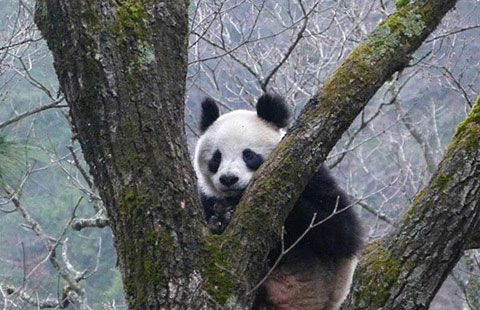Former French PM talks memory of China
By Zhaoxu (chinadaily.com.cn) Updated: 2012-10-15 20:07When you hear a politician says that he has never taken an opposing view, your first reaction would most likely be: How could that be true? But Jean-Pierre Raffarin, who was prime minister of France from May 2002 to May 2005, insists it's true as far as he is concerned.
Raffarin, 64, made the remark while reflecting upon his first journey around China, undertaken in 1976, when he was 28.
"I was a student traveling with a French group from Harbin (Heilongjiang's provincial capital) to Shenzhen (in Guangdong province), and Beijing was right in the middle of that cross-country trip," he says, turning the clock back 36 years.
If there's something remarkable about a foreigner traversing the country in the mid-1970s, what rendered the journey forever indelible from Raffarin's mind was the fact that the group arrived in Beijing on Sept 9, the day Chairman Mao Zedong passed away.
"The nation was gripped by grief — everywhere, people were mourning," says Raffarin who, despite his own purely Western cultural background and political upbringing, had tried to read those bereaved faces he encountered on the streets to understand the sense of loss that had engulfed the country.
It was the memory of those few days that the former French prime minister, who had fought many political battles in his lifelong career, says that he had never belonged to the opposition when it came to listening to the people's hearts.
"You have to first understand before you talk," he says. "It was more important to share the feelings than to make judgments."
However, the sorrow was not the only thing the young Raffarin shared.
"From time to time, we came upon small boys and girls who had little comprehension of what had happened, and as they ran on the streets, their innocent and infectious smiles cast eternal sunshine on our minds," he says.
Members of the group were handed table-tennis rackets by the youngsters and invited to play.
"The results never changed — they always won," recalls Raffarin, trading sad memories for the moments of sweetness.
What had been won were not just the games but hearts as well.
"Those children represented hope — China may be poor and still in difficulty, but its people were rich in spirit," says Raffarin, who would go back to France and write a book titled Life in Yellow.
"What I intended to say through the book was that China would one day retake its place as a first-ranked nation. It needed a lot of time but it would happen. And we would all have to pay attention," he says.
China has long since embarked on that long and eventful journey with Raffarin as a witness on that road. And in the past decade, he has visited China many times, most notably in April 2003, when the outbreak of severe acute respiratory syndrome (SARS) plunged the country into an ocean of fear and sent shock waves across the rest of the world.
That time, he came not as a wide-eyed student keen on politics, but as the prime minister of France, under then president Jacques Chirac.
"Everyone was anxious at the time, but when you are facing a crisis, the last thing you should do is to be anxious," he says, conceding that several of his French colleagues had protested and dropped out of the trip at the last minute.
"Since I wanted to send a clear message to the Chinese people that we were confident in your capital's fight against the disease, I had no choice but to show up at the rendezvous," he says.
It was a rendezvous that turned into a honeymoon for both China and France, culminating 10 months later in a lavish celebration of the Lunar New Year in January 2004 in Paris, with the iconic Eiffel Tower lit up in festive red.
There were positive results on both personal and political levels. During that same trip, Raffarin was invited by Chinese Premier Wen Jiabao for a tour of the site of the National Center for the Performing Arts to the west of Tianan'men Square. Designed by French architect Paul Andreu, the monument was still under construction.
"The tour was not on the official schedule, so it was an impromptu decision," says Raffarin, who considered the gesture anything but being whimsical. He believes it "spoke a lot" about his friendship with Premier Wen.
The two men have since engaged in constant exchanges, according to Raffarin.
"We've been close friends, and I wrote to Premier Wen after the sad, sad situation took place in Sichuan," he says, referring to the May 12 earthquake that wreaked havoc on the southwestern Chinese province just before the Beijing Olympics in 2008.
Asked about his early exposure to classical Chinese culture, the Frenchman cited his visits to Paris' Guimet Museum, which was also a favorite haunt of a young Chirac.
"I remember particularly a painting exhibition dedicated to the Yangtze River. Those ink-on-rice-papers evoked for me a world that's majestic and mysterious," he says.
If in his youth, Raffarin had been drawn to the monumental dimensions of nature's wonder. Today, he is frequently deeply touched by the minute things in life.
Within his personal collection is "The Box", a book-cum-photo album issued by Shang Xia, a Shanghai-based luxury brand spearheaded by young Chinese designer Jiang Qiong'er and financed by France's revered fashion house Hermes. It is essentially a condensed version of the collective memories of the Chinese for the past 100 years.
Filled with old photographs that seem to have dropped accidentally out of the bottom of the drawer, it offers often tantalizing, occasionally sad, but forever tender glimpses of the life and feelings of an average Chinese caught in constant social change.
But could the Frenchman truly see through those images to understand their happiness and haplessness? The answer is a definite "yes".
"I appreciate this approach to history, which is a cultural and a human approach," he says, adding that human beings instinctively understand one another.
A fan of classical Chinese poetry, Raffarin is especially intrigued by the way an ancient Chinese poem ends, often on a nature-inspired metaphor.
"Between the lines, I've discovered harmony and serenity that those came before us had found without and within," he says. And this harmony is what Raffarin believes "lies at the background of our conflict-ridden new world of economy".
"What ultimately links China and France is a shared romantic tradition and a respect for civilization," he says. "It's not enough for the two countries to have good political relations or economic ties. We must understand each other through the art of life."
In 2009, to celebrate the country's 60th anniversary, International Channel Shanghai produced a TV documentary series featuring 10 "old China hands". Raffarin was on a list with former US secretary of state Henry Kissinger and ex-IOC president Juan Antonio Samaranch.
"I've seen the moving of China over the past five decades, and she never fails to surprise me," he says. "For China, I'm an old friend and always a newcomer".
Contact the writer at
zhaoxu@chinadaily.com.cn.
- China evacuates residents after Afghanistan quake felt in Xinjiang
- China's P2P lending lackluster after tightened supervision
- Envoy looks to objective role in Syria
- Trio banned from flying amid calls for detailed rules
- China police issue top-level wanted notice for fraud suspects
- Remedial work takes root along Yangtze
- Hidden paradise found in remote NW China
- Tourists didn't throw away luggage to avoid tax: Customs
- Five detained over Beijing hotel attack
- China's e-pharmacy eyes prescription drug for full-bloom growth








